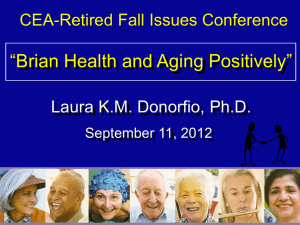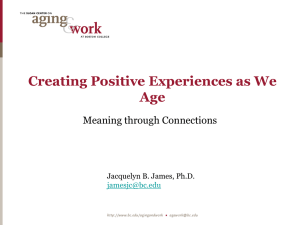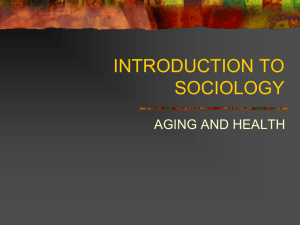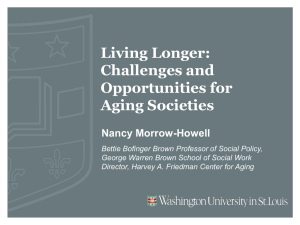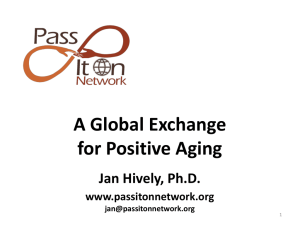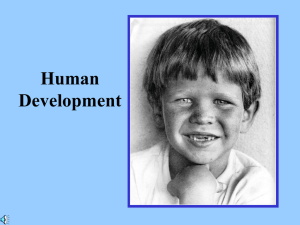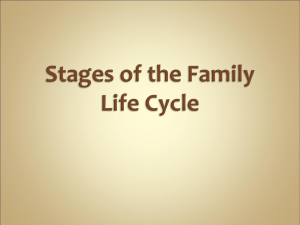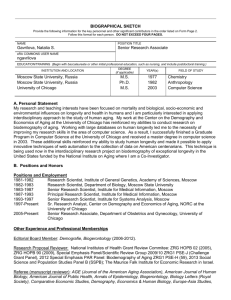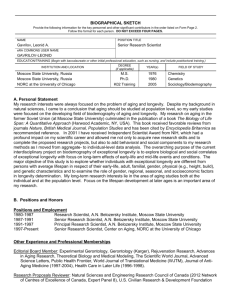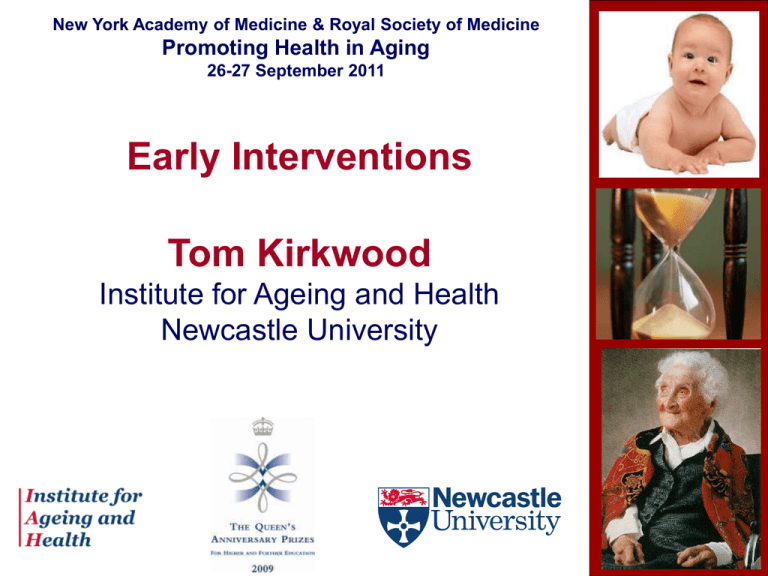
New York Academy of Medicine & Royal Society of Medicine
Promoting Health in Aging
26-27 September 2011
Early Interventions
Tom Kirkwood
Institute for Ageing and Health
Newcastle University
Age and Sex Specific Mortality Rates
The Importance of Early Life
On the one hand …
Development Origins of Health and Disease Coronary Heart Disease and Early Weight
Weight (lb)
At birth
<5.5
-6.5
-7.5
-8.5
-9.5
-9.5
P for trend
Age 1 year
<18
-20
-22
-24
-26
>27
P for trend
Death from CHD
Before 65 years
All ages
1.50 (0.98–2.31)
1.37 (1.00–1.86)
1.27 (0.89–1.83)
1.29 (1.01–1.66)
1.17 (0.84–1.63)
1.14 (0.91–1.44)
1.07 (0.77–1.49)
1.12 (0.89–1.40)
0.96 (0.66–1.39)
0.97 (0.75–1.25)
1.00
1.00
0.001
0.005
2.22 (1.33–3.73)
1.80 (1.11–2.93)
1.96 (1.23–3.12)
1.52 (0.95–2.45)
1.36 (0.82–2.26)
1.00
<0.001
1.89 (1.34–2.66)
1.58 (1.15–2.16)
1.66 (1.23–2.25)
1.36 (1.00–1.85)
1.29 (0.93–1.78)
1.00
<0.001
Barker et al Lancet 1989
Persistent epigenetic differences associated
with prenatal exposure to famine in humans
Heijmans et al PNAS 2008
• Individuals prenatally exposed to famine during the Dutch Hunger Winter
in 1944-5 have less DNA methylation of the imprinted IGF2 gene.
• The association was specific for peri-conceptional exposure.
• Early-life environmental conditions can cause epigenetic changes in
humans that persist throughout life.
The Importance of Early Life
… while on the other hand …
Period and Cohort Effects on Japanese Mortality
Mortality Declines Driven Mainly by Improvements in Late Life
Cohort mortality (females)
Period mortality (females)
1
1
1900
1900
1920
0.1
1910
1970
0.01
Log(ASMR)
Log(ASMR)
1950
2000
0.001
1920
0.1
0.01
0.0001
0.00001
0
20
40
Age (years)
60
0.001
80
0
20
40
60
80
Age (years)
Period mortality (males)
Cohort mortality (males)
1
1
1900
1900
1920
0.1
1910
1970
0.01
2000
0.001
log(ASMR)
Log(ASMR)
1950
1920
0.1
0.01
0.0001
0.00001
0.001
0
20
40
Age (years)
60
80
0
20
40
60
80
age (years)
Engelaer et al, 2011
Aging Begins Early But How Early and Why?
What drives aging?
When does it begin?
What factors modulate healthy longevity?
How to define the elusive boundary
between aging and disease?
How and when to intervene?
Aging – Historically a Rarity, Now Routine
1900
20
40
60
80
2000
The “Disposable Soma”
Kirkwood Nature 1977
Age
The Central Role of Resource Allocation
in Biological Evolution
ORGANISM
Resources
Growth
Maintenance and Repair
Storage
Reproduction
Etc …
Progeny
Kirkwood (1981) in Physiological Ecology: An Evolutionary
Approach to Resource Use (eds Townsend & Calow)
AGING PROCESS AND ITS MALLEABILITY
Kirkwood Cell 2005
Age-related Frailty, Disability, and Disease
INFLAMMATION
ANTI-INFLAMM.
Accumulation of Cellular Defects
GOOD
LIFESTYLE
GOOD
FOOD
Random Molecular Damage
STRESS
ENVIRONMENT
BAD
FOOD
Key Questions About Early Interventions
What drives aging? DAMAGE
When does it begin?
What factors modulate healthy longevity?
How to define the elusive boundary
between aging and disease?
How and when to intervene?
Damage Accumulates From Day One
Each cell division is accompanied by
inevitable somatic mutation
Age-Related Increase in Frequency of Hprt Mutations in Mice
Senescenceaccelerated
mice (SAM)
Wild-type
Odagiri et al Nat Genet 1998
The Deep Mechanisms of Aging
Copying errors,
Telomere shortening
Mutations
e.g. ROS
ROS, etc
DNA
ATP
ROS
Transcription errors
mtDNA
RNA
Translation errors
ROS
Damage,
denaturing
e.g. ROS
PROTEIN
Refolding
Antioxidants
Chaperones
Degradation
or
aggregation (e.g.b-amyloid)
ATP
Mitochondrial Mutations in Human Colon
Taylor et al J Clin Invest 2003
Telomere Erosion, Stress and Health
•Telomeres protect chromosome ends – they shorten with
cell division and this is accelerated by biochemical stress.
• Prematurely short telomeres are linked with increased risk
of age-related disease and diminished survival.
•People suffering severe chronic stress (eg carers of those
with dementia and other conditions) have shorter telomeres.
Senescent Cell (human fibroblast)
●DNA damage foci
●Telomeres
●Overlap of damage foci
with telomeres
●Mitochondria with high
membrane potential
●Mitochondria with low
membrane potential
Key Questions About Early Interventions
What drives aging? DAMAGE
When does it begin? EARLY
What factors modulate healthy longevity?
How to define the elusive boundary
between aging and disease?
How and when to intervene?
Factors Influencing Health Trajectories in Old Age
Genes
Nutrition
Lifestyle
Environment
Socioeconomic status
Attitude
Heritability of Human Longevity Twin Studies
Coefficient of heritability
McGue et al (1993)
Herskind et al (1996)
Ljungquist et al (1998)
0.22
0.25
<0.33
Genes account for about 25% of what determines longevity
Nutrition and Survival: EPIC-Ageing Study
76,707 men and women aged 60+
No CHD, stroke or cancer at
enrolment
Median follow up 89 months
(4047 deaths)
Adherence to Mediterranean diet
assessed on 10-point scale:
0 (poor)…9 (high)
2 unit increment results in 8% reduction of overall mortality
Trichopoulou A et al. (2005) BMJ 330, 991-997
A few minutes on the Metro, a few years …
Ponteland South
74.8
66.1
71.5
68.0
70.1
63.8
Age for expected onset of limiting long-term condition for 55 yr old person
Courtesy Prof Peter Gore/Prof Carol Jagger/ONS
Intrinsic Ageing is Hugely Variable, Influenced but
not Controlled by Genes, Environment, Etc
Kirkwood & Finch Nature 2002
35
30
No dying
25
20
15
10
5
0
0
10
20
30
Days
40
50
Wild type
Age-1 mutation
Key Questions About Early Interventions
What drives aging? DAMAGE
When does it begin? EARLY
What factors modulate healthy longevity? MANY
How to define the elusive boundary
between aging and disease?
How and when to intervene?
No
One Has
Perfect Medical Health at Age 85
Disease
count
Newcastle 85+ Study
Collerton et al British Medical Journal 2009
Mechanisms Underlying Age-Related Disease
Accumulation of Molecular and Cellular Damage
Disease A
Disease C
Likely Effectiveness of Interventions
End-Stage Pathology
Initiating Processes
Disease B
Key Questions About Early Interventions
•
•
•
•
What drives aging? DAMAGE
When does it begin? EARLY
What factors modulate healthy longevity? MANY
How to define the elusive boundary FURTHER
between aging and disease? STUDY OF DAMAGE
• How and when to intervene?
The Importance of Trade-Offs
Longevity
Factors promoting
growth/reproduction
Factors promoting
survival
Is resource allocation
affected by nutrient
availability?
Metabolism and Nutrient Availability
Influence Resource Allocation
ORGANISM
Resources
Growth
Maintenance and Repair
Storage
Reproduction
Etc …
Progeny
• Insulin/IGF-1 signalling promotes growth and storage.
• Low insulin/IGF-1 promotes cell maintenance.
• Low nutrient levels reduce reproduction and promote maintenance
(in short-lived species).
Early Interventions – Prospects and Challenges
Nutrition and lifestyle
Education and attitude
Potential biological targets
Measurement – biomarkers
Regulation
Ethics
Government Office for Science - Foresight: Mental Capital and Wellbeing Project.
“Mental Capital Through Life: Future Challenges”, Kirkwood et al 2008
Thanks to:
Daryl Shanley
Thomas von Zglinicki
Doug Turnbull
Laura Greaves
Glyn Nelson
Joao Passos
Carole Proctor
Joanna Collerton
Karen Davies
John Bond
Carol Jagger
Louise Robinson
Claudio Franceschi (Bologna)
Eline Slagboom (Leiden)
Kaare Christensen (Odense)
Rudi Westendorp (Leiden)
“If I’d known I was
going to live this
long, I’d have
taken better care
of myself”
US musician Eubie Blake
on his “100th” birthday

